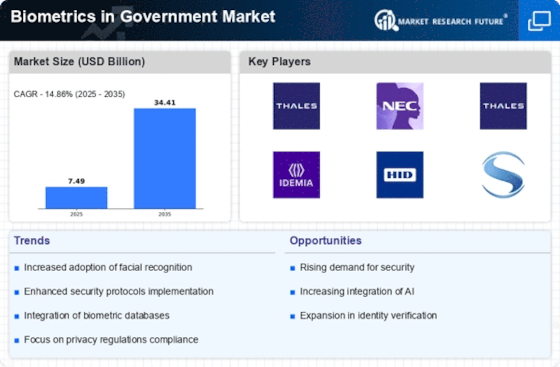Top Industry Leaders in the Biometrics Government Market

The Competitive Landscape of the Biometrics in Government Market
The biometrics market within the government sector pulsates with innovation and competition, driven by the relentless pursuit of enhanced security, citizen identification, and streamlined processes. From border control to law enforcement, government agencies leverage diverse biometric technologies, including fingerprints, facial recognition, iris scans, and voice recognition, to ensure public safety and facilitate citizen services.
Some of the Biometrics in Government companies listed below:
- Aware inc
- Bioenable technologies pvt. Ltd
- Biokey international inc.
- Nec corporation
- Jenetric gmbh
- Innovatrics
- Idemia
- Id3 technologies
- Safran
- Nec technologies india private limited
- Precise biometrics ab
- Secunet security networks ag
Strategies Adopted by Leaders
- Portfolio Diversification: Offering a comprehensive range of biometric solutions across modalities (fingerprint, facial, iris, etc.), deployment options (mobile, stationary), and applications (border control, access control, etc.) caters to diverse government needs.
- Technological Innovation and Integration: Continuous R&D focuses on advancements like improved accuracy, anti-spoofing measures, interoperability with existing systems, and integration with AI and machine learning for enhanced performance and functionality.
- Focus on Specific Government Segments: Targeting segments like border management, national ID programs, law enforcement, and social security with specialized biometric solutions builds expertise and attracts key government contracts.
- Strategic Partnerships and Collaborations: Partnering with technology providers, system integrators, and research institutions fosters knowledge sharing, accelerates technology adoption, and expands solution scope.
- Focus on Data Security and Privacy: Ensuring robust data security measures, adherence to data privacy regulations, and transparent data handling practices builds trust and compliance with stringent government requirements.
Factors for Market Share Analysis:
- Technology Performance and Accuracy: Delivering biometric solutions with superior accuracy, speed, and liveness detection in diverse environments sets players apart for critical applications like border control and identity verification.
- Interoperability and Integration: Offering solutions compatible with existing government systems, open standards, and diverse biometric modalities enables seamless integration and data exchange.
- Scalability and Customization: Providing scalable solutions adaptable to large-scale deployments, diverse agency needs, and future upgrades attracts government agencies with evolving requirements.
- Cost-Effectiveness and Total Cost of Ownership (TCO): Striking a balance between performance, features, and competitive pricing, while considering ongoing maintenance and support costs, is crucial for securing government contracts.
- Data Security and Privacy Compliance: Implementing robust data security protocols, transparent data handling practices, and adherence to stringent government data privacy regulations builds trust and ensures compliance.
New and Emerging Companies:
- Niche Market Focus: Targeting specific areas like mobile biometrics for law enforcement, iris recognition for border control, or fingerprint scanners for social security programs opens up new market opportunities.
- Focus on Emerging Technologies: Integrating technologies like multi-modal biometrics, AI-powered liveness detection, and blockchain for secure data storage positions them at the forefront of future market trends.
- Direct-to-Government Sales and Engagement: Utilizing specialized sales teams and government-specific marketing strategies enables them to directly engage with agencies and tailor solutions to specific needs.
- Open-Source Software and Hardware Utilization: Utilizing open-source platforms and offering modular solutions lower entry barriers and attract government agencies seeking flexibility and customization.
Industry Developments:
Sep. 20, 2023- NEXT Biometrics, a leading global provider of advanced fingerprint sensor technology, announced receiving a NOK 15 million order for its FAP 20 sensors in India. The announcement comes as the Indian government is upgrading its biometric and digital ID services program, Aadhaar, to meet new, stricter security requirements. This multi-year commercial agreement with a new OEM customer in India marks a significant milestone in the company’s expansion in the world’s largest biometric market.
Jul. 30, 2023- NXP Semiconductors, a Dutch chipmaker, announced that it is in initial discussion with the Union government on a project on Unique Identification Authority of India (UIDAI) authentication. The project revolves around chip-based UIDAI authentication incorporating biometrics. Still in the proposal stage, the project revolves around chip-based UIDAI authentication incorporating biometrics.
Jun. 21, 2023- IDEMIA, a French IT giant, announced that it has been selected as GMR Group’s technology partner in India’s DigiYatra project for airport transformation. IDEMIA will provide its biometric tech for India’s DigiYatra Airport Transformation Program that revolves around the use of facial recognition to establish a digital ID for travelers, enabling low-friction airport screening.
Oct 11, 2023- Clear, a leading provider of frictionless digital ID and customer experiences in the US, announced signing a strategic partnership with the healthcare platform b.well Connected Health to boost biometrics in healthcare. The integration means will enable b.well customers to access their personal health information, schedule appointments, and use digital services with one unified login.
Oct 06, 2023- Clear announced that it is bringing its reusable digital identity service to the financial services market with the new one-click know your customer (KYC) application. The expansion of the Clear identity platform includes ID document and selfie biometrics and liveness checks to meet KYC requirements. This move is intended to help consumers complete processes without adding friction that leads to drop-offs from the sign-up process.









